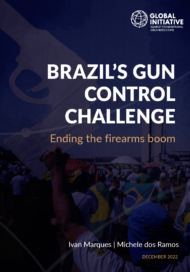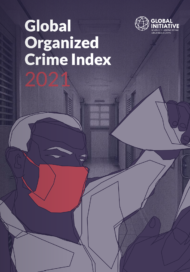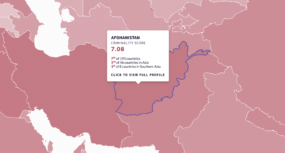Posted on 20 Dec 2022
Brazil has played a prominent role in the dynamics of transnational illicit markets for many years, and in 2021, the Global Organized Crime Index ranked the country 22nd in the world for criminality and 11th in terms of illegal markets. Whether those markets involve the trafficking of drugs, firearms, humans or wild animals, they tend to generate violence – and as the recent history of Brazil and greater Latin America makes clear, relatively easy access to firearms and ammunition means that such violence tends to result in a high death toll.
Brazilian criminal organizations became firmly established from the 1980s onwards, initially focusing on drug trafficking and then branching into other illicit activities. Their subsequent demand for more sophisticated arsenals made the country the foremost destination for international arms trafficking in South America.
In Brazil, criminals obtain firearms in different ways. The stockpiles maintained by the police and security forces are usually seen as the principal sources from which firearms are diverted to the criminal economy. However, it is essential also to look at another source, which, despite receiving less attention, accounts for a significant share of all the firearms and ammunition diverted to criminals: those purchased by ordinary citizens.
In this regard, the measures adopted by the Brazilian federal government from 2019 onwards, which made it easier for citizens to acquire firearms, eroded the already limited effectiveness of policies aimed at combating armed violence in the country. They have also undermined the fight against organized crime in the country, as it has become easier to acquire arms and ammunition. As the Global Organized Crime Index 2021 points out, Brazil faces challenges in terms of law enforcement, contributing to its low ranking of 87th in terms of its resilience to crime.
The unfettered growth of the domestic arms market in Brazil cannot be seen only as a Brazilian issue. New weapons have started being manufactured in the country and are already being exported to neighbouring countries and beyond. Assault rifles and other small arms, such as modern pistols in a multitude of calibres previously restricted to the armed forces, are now widely available, replacing old revolvers bought in the civilian market years ago and surplus rifles from the Falklands War trafficked from Argentina.
This study aims to retrace the historical and political development of arms-control measures in Brazil and explore the dynamics of the domestic and transnational illicit arms market that supplies criminals in the country. It discusses how the government’s actions to ease arms controls and encourage civilians to own and carry firearms are having an impact on public-security policies and strengthening the illegal market.
Following the recent election of a new government under Luiz Inácio Lula da Silva, and his initial statements indicating that he intends to revoke the Jair Bolsonaro government’s policies facilitating civilian’s access to guns, this paper also suggests how to ameliorate arms and ammunition control in Brazil, making the case that such measures are necessary to safeguard democracy not just in Brazil but in the wider region.




